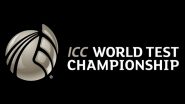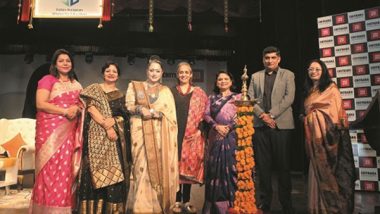NewsVoir
Chandigarh [India], November 24: Chitkara University played host to a dynamic two-day international conference, "Re-thinking Education in the Age of AI," in collaboration with the European Union. Distinguished representatives from leading Indian and European universities, accompanied by policymakers from both regions, gathered to engage in insightful discussions on the pivotal role of education and international collaborations in reshaping societal skills and talents in response to advancing technologies.
Also Read | Rajouri Encounter: India Stands United, Strong Against Terrorism, Says Congress Chief Mallikarjun Kharge.
The conference meticulously organised within the framework of the EDUREFORM capacity-building project and generously co-financed by the Erasmus+ programme of the European Union, facilitated profound deliberations on the socio-economic impact of emerging technologies. These discussions aimed at tailoring bespoke enhancements in study programmes and vocational training, with a particular emphasis on actively involving Indian pre-service and in-service teachers. Furthermore, various dynamic educational institutions actively participated in the conference, bringing forth a rich tapestry of perspectives.
Notable contributors included Unison International School, Chitkara International School, Chitkara University, Chitkara College of Pharmacy, Holy Angels School, Chandigarh Baptist School, Adharshila The Foundation International School, The Mukat Trust International School, Sri Guru Tegh Bahadur Public School, Cambridge Innovative School, Angels Valley School, Sinhgad Institute of Management, SPPU, Bhusawal Arts Science College, The Millennium School, Freelance Management Consultant and Visiting Faculty, and Punjab University. The diverse representation from these esteemed institutions added depth and variety to the collective discourse, creating an environment ripe for shared learning and collaboration. In addition to this, a spirited poster-making competition was organized as an integral part of the international event, drawing enthusiastic participation from students who eagerly showcased their creativity and insights on the topic, "Re-thinking Education in the Age of AI."
The first day of the conference commenced with an elegant official opening and lamp lighting ceremony, featuring profound insights from luminaries such as Prof. Dr. Vijay Kumar Srivastava and Massimiliano Bizzocchi. Prof. Dr. Archana Mantri and Prof. Dr. Sangeeta Pant presented the noteworthy achievements and results of the Erasmus+ EDUREFORM project, addressing the profound impact of the Fourth Industrial Revolution on Indian society. The launch of the Indian-European Alliance for Education and a special issue dedicated to re-thinking education in the age of AI marked significant milestones. Engrossing panel discussions skillfully navigated the role of schools and international cooperation in re-thinking education.
The second day of the conference unfolded with four distinct tracks led by eminent scholars, encompassing teaching pedagogies, technology in education, applied education, and innovation in education. Scholars and faculty from India and Europe presented their meticulously crafted research papers, contributing to a vibrant exploration of pivotal themes in education. Furthermore, the grandeur of Dr. Swaroop Sampat Rawal's book launch event and her subsequent expert talk resonated with intellectual vigour and profound insights.
The launch was hosted as part of the EDUREFORM International Conference. Dr. Sampat is a distinguished figure known for her transformative journey from the world of glamour to the forefront of education. Crowned Femina Miss India Universe in 1979, she transitioned from a successful acting career, including acclaimed performances in "Naram Garam" and "Yeh Jo Hai Zindagi," to become a passionate advocate for education. With a Ph.D. in Education and a Doctor of Letters from the United Kingdom, Dr. Sampat's influence extends globally. Recognized as one of the top ten teachers for the Global Teacher Prize in 2019, she actively contributed to shaping the National Education Policy (NEP) 2020.
Dr. Sampat's commitment to holistic education is evident in her collaborations with UNICEF and crafting the curriculum for Art Education. Her journey embodies the seamless fusion of glamour and academia, showcasing the transformative power of education. During the launch, Dr. Sampat's book, a magnum opus titled "Balancing Play Practice," took centre stage. The audience was treated to a mesmerising presentation as she eloquently unveiled the essence of her work. Then, Dr. Sampat responded to an array of thought-provoking questions with unwavering clarity and passion. She illuminated her extraordinary journey from the entertainment industry to education, citing a pivotal realisation that spurred this transition. Emphasising the need for 'out-of-the-ordinary teachers,' she delved into the qualities defining such educators and their role in shaping the next generation.
Dr. Swaroop Sampat eloquently shared insights into her advocacy for teachers as "agents of curiosity" and promoters of a "search for the 'why' of things." A standout moment unfolded during the audience Q&A when a participant posed a question regarding the intersection of technology and education, specifically in the context of artificial intelligence. Dr. Sampat, with her characteristic blend of erudition and eloquence, provided a nuanced response that transcended the technical aspects, delving into the humanistic dimensions of education in the age of AI. The day culminated with a contemplative address on the future impact of the Fourth Industrial Revolution, coupled with reflections on transitioning from mere capacity-building to the realm of joint research and awareness activities.
Dr. Madhu Chitkara, Pro-Chancellor of Chitkara University, Punjab and Himachal Pradesh, underscored the transformative role of education in the ongoing technological transition, articulating, "The introduction of artificial intelligence and robotics in the manufacturing and service sectors is expected to metamorphose the skills required in the labour market. Education must play a substantial role in supporting Indian governmental and private entities through this technological transition."
The conference also witnessed the official launch of the Indian-European Alliance for Education, creating a shared platform for an international cluster of experts to collaboratively develop initiatives that enhance the societal and developmental impact of higher education. Additionally, riveting panel discussions and a stimulating poster-making competition actively engaged participants in the latest scientific findings on innovation in education.
This international collaboration, spearheaded by Chitkara University, not only marks the successful conclusion of the initial phase of the EDUREFORM project but also sets the stage for sustained joint initiatives and impactful advancements in education. The collaborative endeavours forged during these two days hold the promise of a transformative journey in shaping the future of education.
Chitkara University, situated near Chandigarh, has emerged as the most vibrant and high-ranking University in North India. It is ranked among the top 5% of higher education institutions in India. The University is awarded NAAC A+ accreditation and has also been ranked by NIRF (National Institute Ranking Framework).
The University offers courses in Engineering and Technology, Business Management, Planning; Architecture, Art & Design, Mass Communication, Sales and Marketing, Hospitality Management, Pharmacy, Health Sciences, Law, Psychology, and Education. Students studying at Chitkara get the best start-up support, world-class research excellence, and many internationally renowned opportunities.
For more information please visit www.chitkara.edu.in.
(ADVERTORIAL DISCLAIMER: The above press release has been provided by NewsVoir. ANI will not be responsible in any way for the content of the same)
(This is an unedited and auto-generated story from Syndicated News feed, LatestLY Staff may not have modified or edited the content body)













 Quickly
Quickly

















